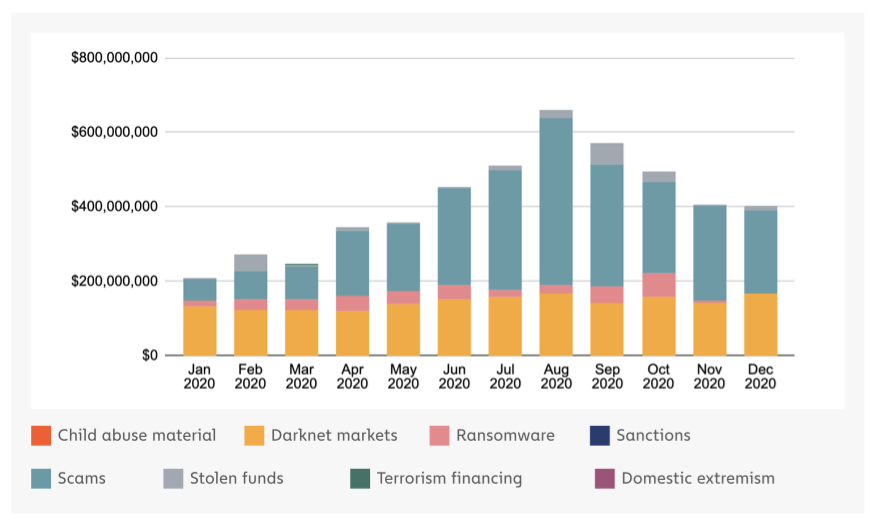Bitcoin crime is overblown in the media by contrarians and politicians that don’t believe in freedom.
If Bitcoin was the currency of criminals, then Fidelity, JPMorgan, Bank of America, Coinbase, VISA, Mastercard, PayPal, 825 institutional funds, the Rockefeller, individual like Richard Branson, Elon Musk, Michel Sailor, Paul Tudor Jones, Michael Robinson, Tim Draper, Peter Thiel, 46 million American and another 70 people million people around the world, are all criminals?
Online crime is everywhere in many forms. It was there before Bitcoin and will always be there. But let’s not blame the gun for the murders. Like fiat currency, it is simply a tool used by criminals.
The overall picture is three-fold:
Cryptocurrency-related crime is falling, it remains a small part of the overall cryptocurrency economy, and it is comparatively smaller to the amount of illicit funds involved in traditional finance.
According to Chainalysis, In 2019, illicit activity represented 2.1% of all cryptocurrency transaction volume or roughly $21.4 billion worth of transfers. In 2020, the illicit share of all cryptocurrency activity fell to just 0.34%, or $10.0 billion in transaction volume.
By last year, as exchanges began to worry more about regulation, many of them bolstered their anti-money laundering (AML) and know-your-customer (KYC) processes and the share shrank to 45 per cent.
Stricter rules have pushed some criminals towards unlicensed exchanges, which typically require no KYC information. Many operate out of jurisdictions with less stringent regulatory requirements or lie outside of extradition treaties. But overall the window for criminal financing crime through Bitcoin is shrinking. Such exchanges tend to have lower liquidity, making it harder for criminals to transfer crypto into fiat currencies.
In 2020, Scams made up the majority of all cryptocurrency-related crime, at 54% of illicit activity, representing roughly $2.6 billion worth of cryptocurrency received.
However, both the value and share of all criminal activities represented by scams is much smaller than in 2019., In 2020 as there were no scams comparable to those like the enormous PlusToken Ponzi scheme, which took in over $2 billion from millions of victims. Darknet markets were once again the second-largest crime category, accounting for $1.7 billion worth of cryptocurrency activity, up from $1.3 billion in 2019.
The big story for cryptocurrency-based crime in 2020 is ransomware, but it’s a small percentage of the total crime chart.
Ransomware accounted for just 7% of all funds received by criminal addresses at just under $350 million worth of cryptocurrency. Even if that figure figure represents a 311% increase over 2019, the overall dollar amount is way lower that other crime like scams and the darknet.
Crime categories by percentage increase in cryptocurrency received, 2018 – 2020

By understanding these trends, law enforcement, regulators, and the private sector can work together to ensure cryptocurrency-based crime continues to fall.
Dismantling the narrative that Bitcoin is untraceable.
A contributor to Bitcoin cime falling is that Bitcoin is not an untraceable, anonymous, malicious tech used by hackers and nefarious crime syndicates. It is a decentralized, fully traceable, secure peer-to-peer payment system built on the blockchain. While the digital currency can be created, moved and stored outside the control of any government or financial institution, each payment is recorded in a permanent fixed ledger.
That means all cryptocurrency transactions, including Bitcoin, are out in the open. In other words, the anonymity associated with crypto and crime is unfounded. Earlier this summer, United States investigators were able to trace Bitcoin worth more than $4 million that the Colonial Pipeline had paid to the hackers during an attack. This not only highlights the traceability of cryptocurrencies but proves that the common assumption of anonymity is incorrect.
In the United Kingdom, British police seized around $155 million worth of Bitcoin from a criminal gang.
This highlights the expansion of policing capabilities. The real-world examples of police tracing BTC transactions dismantle the idea that Bitcoin is an untraceable “crime coin.”




